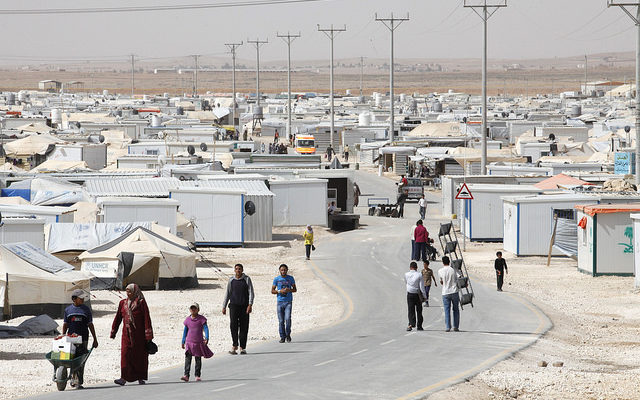A Review of “Refuge Lost: Asylum Law in an Interdependent World”
Refuge Lost: Asylum Law in an Interdependent World
Daniel Ghezelbash, Cambridge University Press, 2018
The “refuge lost” in the book’s title is literally true in President Trump’s America. Since he took office, US decisions have eliminated almost half of the world’s total resettlement allocation for refugees; a White House insider quotes one of his top policy advisers as saying “I would be happy if not a single refugee foot ever again touched American soil.” Trump’s derogatory words about “shithole countries” and his preference for blue-eyed Norwegians echo the extremists who have influenced the policies of major parties, including in Norway.
But the reduction in numbers is just the visible instrument of exclusion. This book by Daniel Ghezelbash, a legal academic at Macquarie University, reports on what is probably less well-known, namely the collaboration over decades between the US and Australia on avoidance and deterrence strategies in the cat and mouse game of refugees versus governments and their domestic law-making.
The so-called “Australian solution” of anti-refugee strategies has been promoted in Europe by Tony Abbott and locally by Scott Morrison, who claimed credit for Trump’s January 2017 bans, boasting that “ the world is catching up to us”. However, the author reports that compulsory detention in Australia from 1994 was copied from the US deterrence of Haitian and Cuban refugees in the early 1980s, and extensive US advice on offshore processing and “maritime interdiction” was provided prior to the inception of the “Pacific Solution” after the Tampa event of 2001.
Not having legal expertise, I can’t comment on the legal explanations or analysis in this academic monograph, which is the second publication in the Cambridge Asylum and Migration Studies Series, and comes highly recommended by Professor Michelle Foster of the Melbourne University Law School. The author writes about the history of mandatory detention, maritime interception and extraterritorial processing in both countries (up to June 2017), and compares their jurisprudence and institutions. International law covering these areas is explained and the record of recent Australian refugee events is also useful.
After discussing the different methodologies of comparison – legal transfer, policy transfer and diffusion – he takes an interdisciplinary approach to the process of transfer between the two very different legal systems, how the courts in each jurisdiction dealt with new measures, and how their success might be evaluated. As well as circumstantial evidence, the author provides direct evidence from official sources and interviews of US and Australian decision makers. Practices in other countries, including Thailand, Malaysia, Indonesia, Canada and New Zealand are surveyed, and their successes in law, program and processes are reported.
Informal and non-binding Regional Consultative Processes, often under the aegis of the International Organisation for Migration (IOM), can be a forum for spreading best practice, building capacity and learning, with the commonalities between contiguous countries enabling relevant exchange. But he shows that the policy transfers are generally around a common theme: the dominant objective is to find asylum-denying laws and policies, not to facilitate a positive future for legitimate claimants.
This reluctance to cede national sovereignty has led to a white-anting of the Refugee Convention over many years, leading to today’s harsh approaches – it’s not just a panic response to today’s large number of global refugees. The lack of a means of enforcement allows much divergence from the Convention, with wealthy liberal democracies being repeat non-compliers. In today’s more connected and dynamic world, where refugees are said to have greater agency in their pathways, some states will signal they are not a ‘soft touch’ by declaring their hostility to irregular migrants, so deterrence has become the ‘dominant paradigm’. The trend of “mixed flows” of migrants and refugees towards Europe and the US has led to a binary sort into “good” and “bad” claimants, resulting in eligible (under the Refugee Convention) claimants being put under greater suspicion and a higher burden of proof demanded. But arguably this is not relevant to Australia: our mixed flow of the last few years can be segmented nationally, with a big increase in Chinese and Malaysian claimants coming by plane, and low success rates on assessment (reported as 2% for Malaysian claimants).
Tony Abbott said it was “to preserve safety at sea” that he supported the turning around of decrepit boats in the Andaman Sea in 2015. This reminds us that an increased incidence of countries adopting the “Australian solution” would lead to a competitive “race to the bottom”, with a decline in observance of international protection norms and an unravelling of the system. Fortunately, the Australian situation is being explained more fully to those in Europe who listen to Abbott. The paradox is that the interdependent world mentioned in the book’s title means that the loss of a refugee treaty would be disastrous for the international order. Management of inevitable refugee situations demands a degree of international co-ordination, and governments need a stable order for domestic legitimacy, so there is a political cost to them if they jettison the Refugee Convention. Dr Ghezelbash warns of the human, social and financial damage from ‘competitive interdependence’: a race to the bottom, jeopardising access to asylum and international human rights.
An area of government influence over the Australian administrative architecture not examined here is Refugee Status Determination, recently controversial due to the appointment by the Attorney General of a large number of its co-thinkers to review these decisions at the Administrative Appeals Tribunal. This may be because earlier research suggests that refugee/non-refugee assessment decisions in Australia, Canada and the US are determined by the different boundaries between their administrative, judicial and political layers.
Kevin Bain reviews refugee books at Independent Australia, and has compiled a Reading Guide for Mornington Peninsula Human Rights Group.
